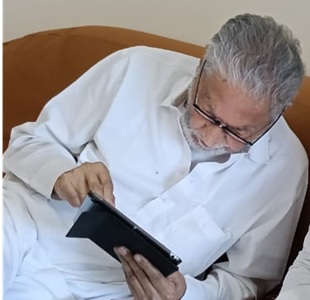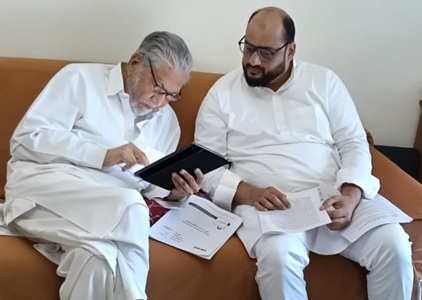New Delhi : On the 13th day of the Mahabharata war, Dronacharya organised the Kaurava army into a “chakravyuh” formation to challenge the Pandavas.
With the great warrior Arjuna away, there was none among the Pandavas who could counter this. Then came Abhimanyu, Arjuna’s son who knew how to break the “chakravyuh” (labyrinth) and sought permission from Yudhishthira to lead the battle.
Abhimanyu entered the chakravyuh by defeating seven great warriors on the Kaurava side, guarding the seven fronts of the formation. He killed several princes and kings, besides a large number of Kaurava soldiers, sending jitters down the enemy lines. Then flouting all rules of war, a number of great warriors, including Karna, Drona, Jayadrath, Ashwathama and Kripacharya, attacked Abhimanyu together.
Abhimanyu fell but not before upsetting the Kauravas’ plans to wipe out the Pandava army.
Circa 2017: In the Gujarat Assembly elections, it was not a battle between the newly-elected Congress President Rahul Gandhi versus Prime Minister Narendra Modi — it was Rahul versus the entire government machinery and more.
The entire Modi cabinet camped in the state and Union ministers conducted door-to-door campaign.
The Congress could not boast of any star campaigner besides Rahul Gandhi. After Shankarsinh Vaghela deserted the party, there was no leader of stature whom the party could project as its face. It was an unequal battle from the time the election schedule was announced.
The Bharatiya Janata Party (BJP), ruling in the state for 22 long years, can rightfully boast of a strong cadre on the ground and at the booth level, in a state that is called the “Hindutva lab”. The Congress cannot match it.
Then, the Election Commission (EC) did what many called an “unprecedented” act of withholding announcing dates for Gujarat elections while declaring details of Himachal Pradesh’s polls. Thus the Model Code of Conduct (MCC) did not come into force in the state as it did in Himachal.
Chief Election Commissioner A.K. Joti could not give a credible explanation for this and mostly resorted to technicalities in response to a volley of questions from a surprised media.
Joti cited flood relief as one reason for delaying the Gujarat polls. But in 2014, when Jammu and Kashmir had not recovered, even partly, from the devastating floods, the same poll panel did not hold that relief work would be affected by elections.
The opposition’s allegations and media’s scepticism over the EC’s neutrality gained currency as Prime Minister Narendra Modi announced sops for Gujarat worth hundreds of crores of rupees, including a Ro-Ro ferry service in the 15-odd day window the state got before the model code came into force.
However, some people also attributed Joti’s concern for Gujarat to the fact that he had worked in the state for a long time in several key positions, including as the chief secretary, when Modi was Chief Minister.
It cannot be discounted that Modi hails from Gujarat and hence the people of the state have an emotional connect with him. Besides, Rahul Gandhi, comparably a political novice if not an amateur, who has held no position ever in a government, is no match for Modi’s oratorical skills that can make huge crowds sway to his tune.
But during the election campaign, in rally after rally and speech after speech, Gandhi emerged as an evolved politician — a far cry from the “Pappu” (a colloquial meaning dumb kid), as his detractors repeatedly called him. Even its ally Shiv Sena asked the BJP to stop calling Rahul by the disparaging moniker and to take him seriously.
Gandhi studiedly avoided any contentious topic and personal jibes against Modi, such as “Maut ka saudagar” (merchant of death) and the like that his mother, Sonia Gandhi, had used in a previous election. He focused on issues and attacked Modi and his government on these alone.
Against all odds and in spite of the ruling BJP’s full might — which did not fight shy of using religiously divisive language to the hilt — the Congress showed a marked improvement in both its tally and vote percentage, at the BJP’s expense.
Of course, there was also a strategy in place on the ground from ticket distribution to synchronising with dynamic caste equations — spearheaded by Congress’ old fox, Ashok Gehlot. And, of course, there was anti-incumbency feeling against the BJP, with palpable disenchantment among the masses, especially in rural areas. But it was not easy to translate this into votes for the Congress.
Gandhi, through his visibly mature demeanour and careful selection of words, successfully tapped this anger to a considerable extent. Despite repeated insinuations, he did not utter a single contentious word against Modi.
In one rally he declared: “No matter what they call me, I will not speak any derogatory language. This is Congress culture handed down to us by the likes of Mahatma Gandhi, Pandit Jawaharlal Nehru and Sardal Patel… We will defeat Modiji with love.”
In the Mahabharta, the Pandavas could not match the mighty Kauravas’ onslaught on chakravyuh day and suffered heavily. Abhimanyu, despite knowing fully well that he would not be able to come out of the chakravyuh, fulfilled his dharma of fighting till he fell.
The Congress showed a remarkable improvement as compared to the 2012 election. Its seat count climbed to around 80 from 61 in 2012 and its vote share rose to around 42 per cent from 39 per cent, within striking distance of the Gujarat throne. Modi would do well to heed this rejuventated Abhimanyu of the Grand Old Party. The battle may have been lost, but the war is on.
(Asim Khan can be contacted on mohd.a@ians.in)
—IANS






0 Comments